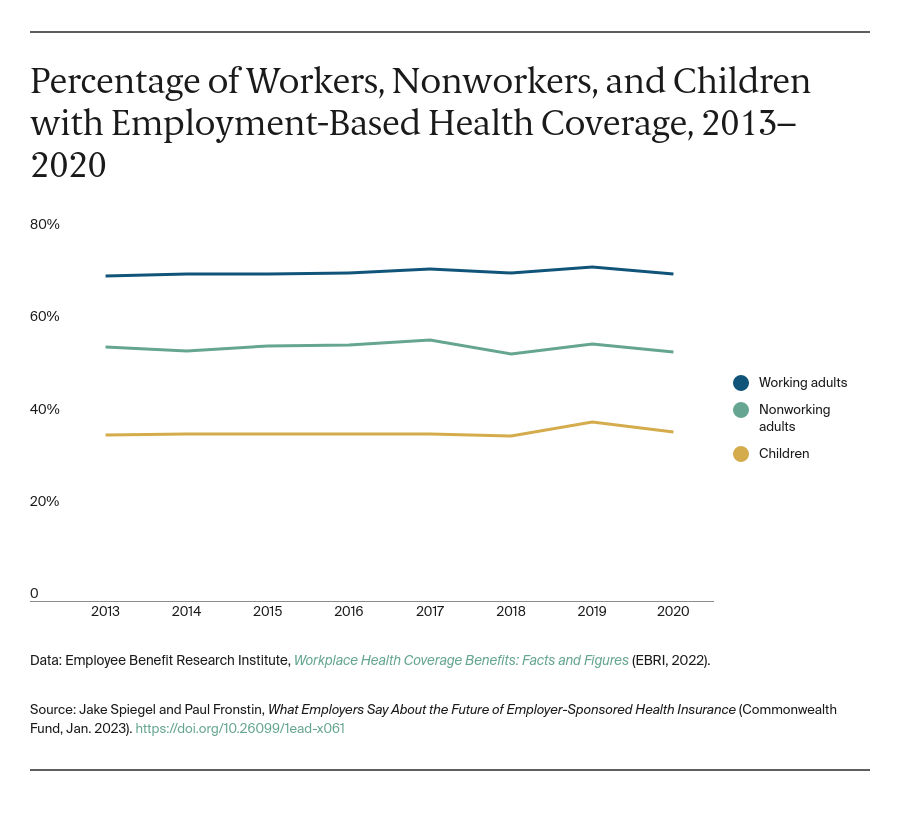When asked why employers did not embrace ACA exchanges to offload the responsibility of providing health benefits, benefits executives’ responses echoed several themes. First, employers thought they could offer their workers a better deal than what employees could conceivably get on public exchanges. “We liked to have control. We can do a better job with design than the exchanges,” explained a benefits executive at a health care company.
Second, many of the benefits executives viewed their companies as paternalistic. “[Employees] trust their employer, and that the employer will give them the tools and knowledge they need to navigate their care,” said a benefits executive at a large financial services firm. Some also flagged complexity as a potential issue, given that public exchanges typically offer significantly more plans than employers do, and the vast array of choices may overwhelm workers. “Every survey we’ve done says that our workers want more choice, but when that choice comes, they want us to choose for them,” explained a benefits executive at a telecommunications firm.
Finally, some employers simply took a wait-and-see approach to determine if other companies were willing to upend their employee health benefits. “A big part was trepidation,” explained a benefits executive at an insurance company. “Nobody wanted to be first.”
Why Did Private Health Exchanges Never Take Hold?
Many benefits consultants believed private health exchanges would transform health benefits by giving workers greater choice, a goal that companies also hoped to achieve through other benefits changes — such as moving from defined benefit to defined contribution retirement plans. Private health exchanges gained some early traction when Sears and Darden Restaurants announced they would allow their workers to purchase insurance from a private exchange operated by a benefits consultancy in 2013. However, aside from several early adopters, private exchanges did not gain much uptake.
When interviewees were asked why that was the case, several themes emerged that mirrored employers’ views on the ACA’s impact on employer health coverage. Once again, many interviewees invoked paternalism as a reason for keeping their employer-sponsored plan. “It would make workers feel like you were cutting and running,” said a benefits executive at a manufacturing firm. “We don’t want [workers] out shopping on their own, [exchange plans] aren’t easy to understand,” added a benefits executive at a financial services company.
Private exchanges did have their appeal, but benefits managers were wary about giving up control, believing that they could better contain costs and provide a better experience for employees than private exchanges. “The problem is escalating costs going forward . . . there [would be] no control over what would happen,” explained a benefits executive at an insurance provider. An executive at a large technology firm had similar concerns: “We don’t want employees coming back to us after a few months, saying ‘this doesn’t work for us.’”
Individual Coverage Health Reimbursement Accounts: Not a Fit for Employers or Employees
Individual coverage health reimbursement accounts (ICHRAs) represent another opportunity for employers to change how they provide health benefits. Created by a rule enacted in 2019, ICHRAs let workers purchase health plans from ACA exchanges using pretax dollars from an account funded by their employer.5 This allows employers to limit their involvement in selecting health benefits for their employees.
To start, many interviewees indicated that they were not familiar with ICHRAs. When informed about them, interviewees were skeptical that their companies would take this approach in the near future. Their reasons — wanting to retain control over plan design, for example — echoed their rationale for maintaining the status quo in the face of other developments, such as the advent of private exchanges.
Several interviewees noted that funding ICHRAs and shunting workers to ACA exchanges deprived the company of the opportunity to bend its cost curve. Keeping workers enrolled in employer-sponsored insurance allows companies to employ strategies to help workers manage expensive health conditions. For instance, IRS Notice 2019-45 allowed employers to cover certain drugs and services on a predeductible basis for workers enrolled in high-deductible health plans with health savings accounts (HSAs). Employers that adopted these provisions may have been motivated by a desire to lower barriers to low-cost preventive care and reduce the probability of high-cost claims.
By giving workers ICHRAs to purchase insurance on public exchanges, companies effectively forfeit this control. “I don’t know that insurance companies can manage [medical cost] trend better than we can,” explained a benefits executive at a large manufacturing firm. Additionally, employers would have less control over rising premiums and how those higher costs would affect their workers. “Workers would be dealing with an entity that isn’t sensitive to increasing their premiums,” said a benefits executive at a financial services company.

